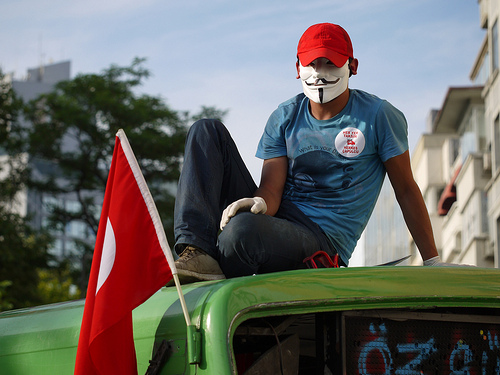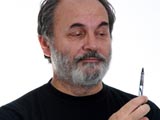The Park, the Prison, and the Politician
by Tarık Günersel / July 19, 2013 / No comments
This isn’t an excerpt from a Beckett play or one of Kafka’s novels; it is what’s happening now in “my” country.

Turkey's Gezi Park protests exemplify injustice and censorship. Photo: Zsombor Lacza via Flickr.
“Why is dad in prison, Mom?”
“Because he was helping people, son.”
“Then he shouldn’t help anymore.”
This is an excerpt from a conversation Muharrem Erbey’s wife had with one of their two children recently. They have been waiting for Erbey’s release for three and a half years now. Erbey is a Kurdish writer, lawyer, the head of the Diyarbakır Branch of the Human Rights Association, and a member of PEN Turkey.
Now, consider the video below: A man wearing a white shirt carries a meat cleaver in his left hand. He attacks a young woman, and then kicks her.
Video: TaksimGeziTV via YouTube.
What do you think happened to him? He was taken to the police station and then released. A lawsuit is on the way, but he has not been arrested. Upon protests, the court decided to arrest him but he has escaped to Morocco with his family.

- Life is words in action, literature is action in words.
Humans are about to destroy their spaceship Earth. Some of them are aware of this and they try to change the course of events. Will they succeed? Will more humans be alarmed and do something?
Literature is vital and translators are messengers of world peace.
Though I shall focus on the literary scene in Turkey and its problems regarding freedom of expression, I shall not omit the other parts of our planet. Today local is global and vice versa. 
- Tarık Günersel is a poet, playwright, aphorist, librettist and short story writer. He is the president of PEN Turkey and an ex-member of the PEN International Board. He studied English Literature at Istanbul University. A self-exile after the military coup in 1980, he spent four years in Saudi Arabia with his wife Füsun and their daughter Barış, teaching English. A dramaturg at Istanbul City Theater since 1991, he has acted on stage and screen and directed some of his plays. He proposed World Poetry Day in 1997 which was accepted by PEN International and declared by UNESCO as the 21st of March. His translations into Turkish include works by Samuel Beckett, Vaclav Havel and Arthur Miller. His works include The Nightmare of a Labyrinth (mosaic of poems and stories), and How’s your slavery goin’? His Oluşmak (To Become), a “life guide for myself,” includes ideas from world wisdom of the past four millennia.
Four men who raped a young girl have also recently been released.
“People like them go free and people like me are in prison!” Erbey says. “Is this justice?”
PM Erdoğan’s Justice and Development Party (AKP) should be able to answer him. Instead, they remain silent.
A public park closed to the public
“Why can’t I enter this public park?” asked a citizen. “Which law prohibits me?”
“Which law says you can enter a park?” replied the policeman.
This dialogue is not from a Beckett play or one of Kafka’s novels. It’s taken from real life—in “my” country, under the reign of His Majesty Erdoğan, who is upset because the demonstrators have won and the court decision is in favor of Gezi Park.
Censured Journal of History
On the evening of July 8, upon the invitation of the leading group of organizers called “Taksim Solidarity,” many people wanted to enter the park but were blocked by the police. My friend Halil Ibrahim Özcan and I were on our way there when the police attacked with a different kind of gas. Three children, one of whom was a baby, were affected and taken to a hospital. Hundreds of other citizens needed treatment. More than thirty intellectuals, the leaders of the Taksim Solidarity Platform, and some politicians, have been taken into custody. Some TV channels are simply not showing what is going on or has happened.
NTV is a TV station financed by Doğuş Holding. The program NTV Journal of History has been discontinued due to an episode that was prepared on the events in Gezi Park. It is now available on the internet under the name Yaşarken Yazılan Tarih.
Note: In Turkish “yaşarken yazılan tarih” means “history recorded as it is lived,” like a live broadcast.
Definition of “coup”
The Turkish Language Association (Türk Dil Kurumu), which was originally founded by Atatürk in the 1920s, was restructured by the dictator Kenan Evren after his military coup in 1980. Erdoğan talks about writing a democratic constitution, but he defends and uses every anti-democratic element in the current constitution, which was dictated by the military junta in 1982: Religion (imposing Sunni Islam and making little reference to other views) is still obligatory in schools, and a party needs to get at least 10 percent of the votes in order to have any seats in Parliament.
Here is yet another awkward point: In the dictionary, published in 1998, the definition of the word “coup” includes “putting pressure on a government by democratic means to force it to resign.”
Thus, if you say or write “The government should resign!” you may be considered a terrorist involved in a coup d’Etat and spend a few years in jail without a conviction as a result. Erdoğan’s advisors may not prefer to make a massive number of arrests before the local elections in 2014 and the general election in 2015, but it’s true that nobody can tell what he will do, or when.
If a party that has been elected upon promising democratization but exercises despotism, isn’t that a coup d’Etat? Is that government still legitimate?




